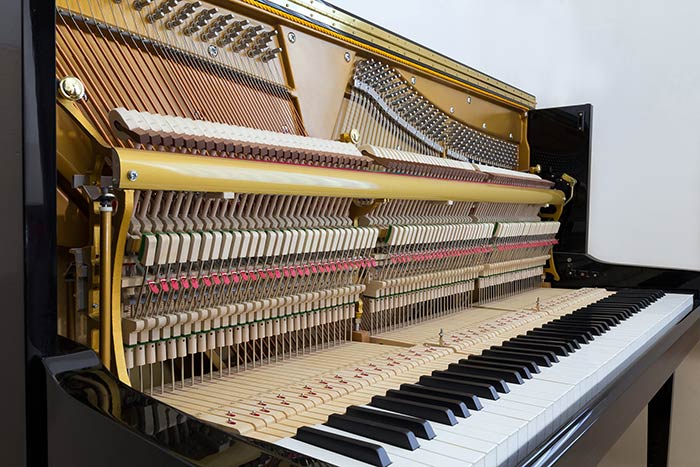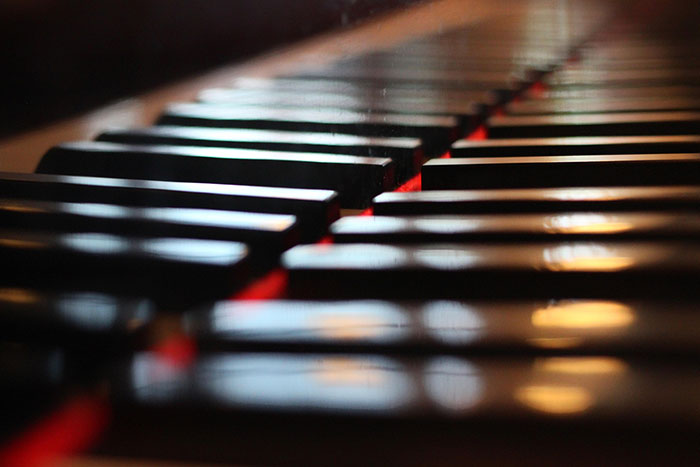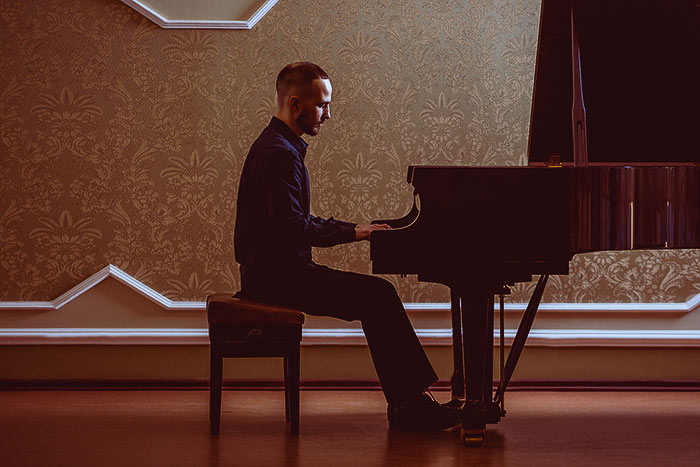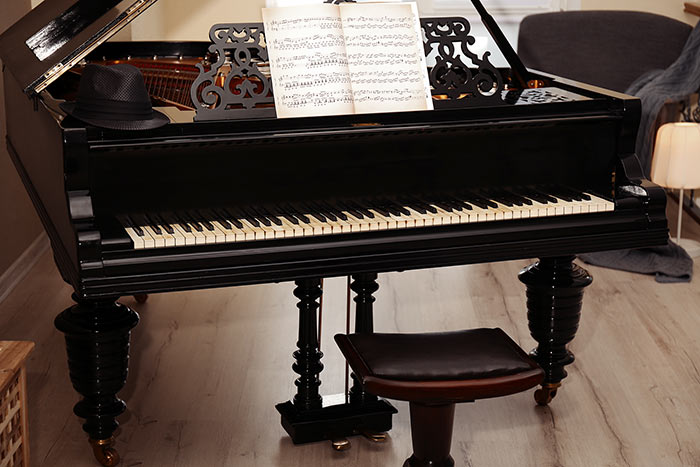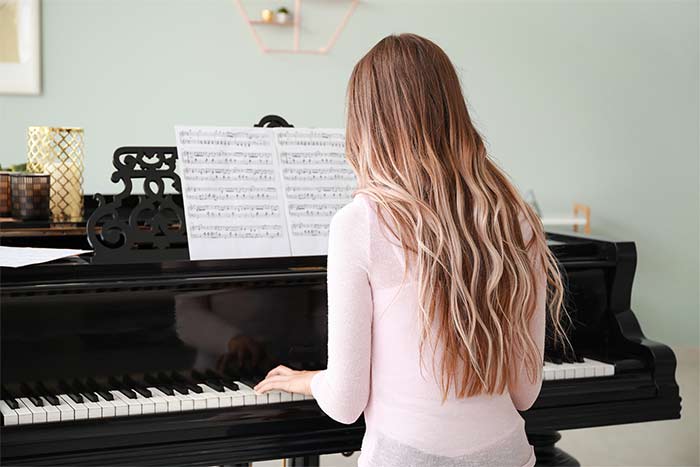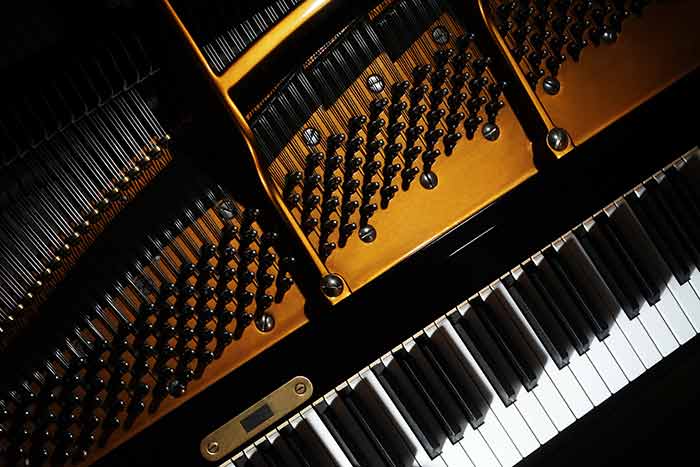How and when did you develop your passion for the piano?
It was early on in my life, it started since I know of myself. My father is a pianist and my older sister is violinist, music was surrounding us since we were born. We would go to sleep listening to classical music tapes and were in general encouraged to play songs or music that we heard. The piano was the central piece in our living room and I considered it a fun toy.
I loved music straightaway and would always dream awake while listening. It felt like one of the very few activities that gave me direction and where I didn’t feel a bit aimless or bored.
A lot of our family friends were folk, and pop/rock musicians, plenty of rehearsals happened in our house with, really, all kinds of characters. Singers, songwriters, guitarists, accordionists. It was fun to be exposed to all of that. I started music school when I was 6.
Do you remember your first piano teacher?
I do, but vaguely as I changed several teachers in the first 6 years.
There are a few people who left a huge mark in my heart and even though I was very young I remember with which passion they worked with me. Sneža Krstić was the first person I felt a proper student-teacher relationship. I was about 8 years old. She would take me to competitions, I was friends with her children and often would sleep over if we would travel the next day. It was instantly clear that this piano playing business is very different than anything else my friends were experiencing, so I definitely always felt like the “different one”. Not necessarily a black sheep, but certainly very different.
What about your first performance?
No. I don’t remember it at all! Must have been when I was 6. I’ve seen some pictures of myself with one tooth missing but looking super focused.
Where did you complete your piano studies?
You are never done studying, unlike in many other professions, it never turns to just execution of previously acquired knowledge. For the formal part…
I studied at the University of Music Art in Belgrade, Serbia, for 5-6 years with Aleksandar Šandorov. That was one of the most significant relationships in my life and I was changing and growing every week. It is luck (as I started studying very young, at 16, 17 years old ) to have had Saša as a friend and teacher, one of the finest and classiest pianists I have ever heard. I still think that. It shaped me into who I am now, and I have immense gratitude for this man, his musicianship and pianism, and the knowledge he gave me.
I continued Masters and Fellowship at Guildhall School of Music and Drama, here in London. I felt so intimidated by the relentlessness, speed, and density of London, that I just felt I lost my confidence, my rhythm and my voice. Then I rebuilt it, I think very slowly, and now I feel very comfortable here, as well as with who I am. With a nice concert flow – it really is a fantastic place to be. I completed my masters with wonderful Caroline Palmer and my fellowship with Ronan O’Hora and (very atypical for a pianist) with violinist David Takeno. These people have given me invaluable time and energy. I’ll never forget many of the lessons they gave me, the inspiration and the challenges.. and am confident that their knowledge is now a part of how I play and think. This is the main importance of a teacher, to pass on the knowledge and to open in students- some doors that might have been shut. I have been nothing but lucky with people who have guided my musical and personal growth.
What would be your advice to a young pianist who wishes to become professional?
Ha. Tricky one! You know, there are easier professions. We really do work as athletes, from a young age, dedication is the way of being. Unless you can’t live without music, don’t waste your time.
For that, I think – trust your instincts.
Otherwise, full steam ahead, I think that overall awareness is the crucial part. Knowing oneself. Being an informed intellectual with a strong voice and a passionate heart. And I can’t stress enough, stop practising fixed hours! Meaninglessly. Always express, improvise, compose, open up. “Musician” is a strong title! It’s for those who comprehend the whole category. Not the mechanics of one instrument and how to press the right key at the right time. To try and find the flexibility- between staying truthful to the core of music and the score, while being creative.
Most pianists find teaching and performing very complimentary. How does performing help you teach better and vice and versa?
I don’t think that performing helps me teach better, it just gives me more information. I anyway, always teach with performing in mind, so it dictates everything, at least for me. I would say that teaching helps me practise better, and consequently perform better. In several categories. Mainly, a reminder that hands just do, what your brain tells them to. So when we practise we should really polish our thinking. Easy to miss this and go into the physicality of playing, and going through the motions. It teaches me patience, it also teaches me how everyone is different and how often – just trying something else is a huge refreshment and a wake-up call.
It is very important to tailor your teaching to the student’s personality and needs. And this is my favourite puzzle and often a seriously mysterious task, how to unlock an obstacle or a blockage. It’s satisfying knowing you might have influenced someone’s perspective on anything.
What was your best performance to date?
Really, a hard question. Apart from the fact that it’s never the same for myself and the audience, there are times when I’d like to escape my own skin, but people give me a very nice feedback. And vice versa. A full state of flow on stage is rare but very addictive. You feel you are on the waves of a natural force, and you guide it a bit.
You never know if you really “nailed” it, you just know when you didn’t.
This is a quote from someone, but I can’t remember who. My suspects are Olivia Coleman or Tamara Stefanovich, but I will have to double-check 😂
I don’t know what do you mean by “best” performance, certainly, most special ones were my second time in Barbican and Prokofiev Concerto no 3, and Royal Festival Hall with the chamber musicians from Philharmonia Orchestra. Once I stopped obsessing over the size of the hall, I settled into music.
Which composer do you enjoy playing most?
I can’t pick one or even five. Bach, Rameau, Mozart, Prokofiev, Brahms, Ravel, Schubert, Enescu, Rachmaninov. And lately a lot of Beethoven. Now I feel bad for leaving everyone else out. Except for Liszt.
I try to programme my repertoire to include at least one composer from the three major groups (French, Russian, German)
What are your challenges as a young concert pianist?
Maybe consecutive performances of the same piece. Often on tours or at home, consecutive performances disrupt the “normal” rhythm. And you have that Concerto or the same recital repertoire as the only anchor point. I find it emotionally hard if I don’t recharge from the evening before. Very special performances can be incredibly draining.
Another challenge I’d like to be better at – is cleverer repertoire combinations. It is usually rare to have fantastic pieces chosen and well put together so that entire recital feels like a story, and all the characters in it- composers, myself, audience and the present moment, are becoming more inseparable. As I listener, I truly love when that happens in concerts, and there is no- any kind of separation or compartmentalising. With true artists, you just sit there mesmerised wondering what’s going on, and how!
Also, I am not a young pianist! Those days are over, I can show you my ID!
What is your biggest dream as a pianist?
A lifestyle of complete balance and flow. Always towards a performance and the storytelling of it. To surround myself with like-hearted musicians, who as up until now, make life bearable. To play a lot of concerts and to teach students at a fantastic Music Academy. The ideal dream is fulfilment on every level. Love, healthy family, wonderful friends, and you know, no big disasters. I am already living a big portion of my dream.


